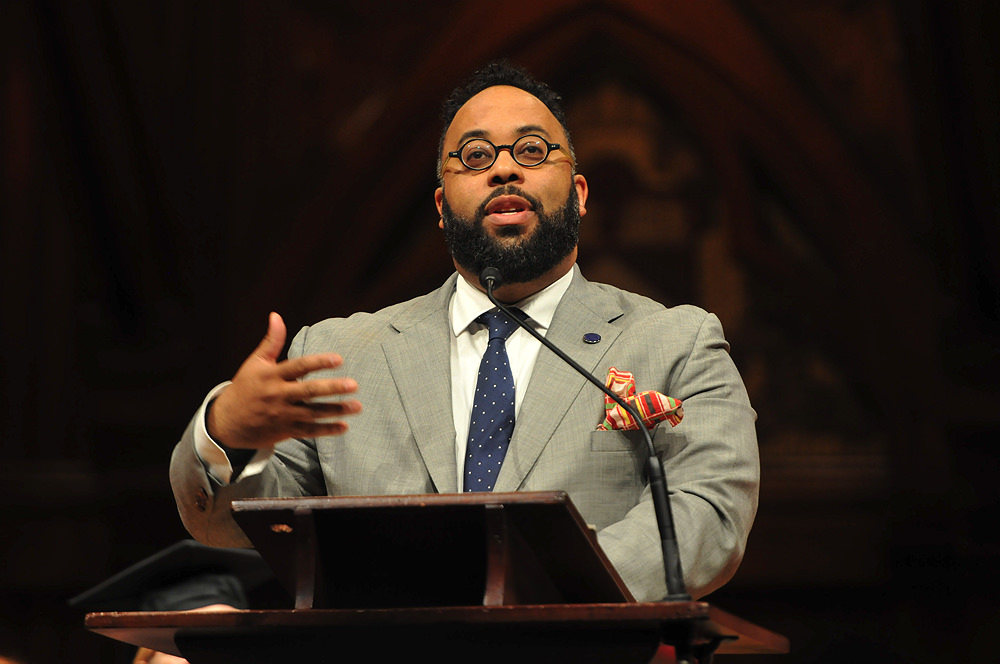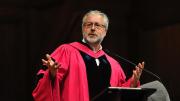Graduating seniors and their entourages gathered in Sanders Theatre this morning for the 228th Phi Beta Kappa (PBK) Literary Exercises, officially kicking off Commencement 2018.
This year’s ceremony was a special occasion: it was first time that professor of organismic and evolutionary biology Hopi Hoekstra ran the show as chapter president, and the last time Drew Faust would attend as Harvard president. (Harvard’s PBK chapter also had a new Chief Marshal, senior lecturer on chemistry and chemical biology Gregg Tucci.)
Teaching Prizes
This year’s honorands, nominated by the society’s undergraduate members, selected by its undergraduate marshals, and presented by Wolcott professor of philosophy Alison Simmons, were:
- Ann Blair, Pforzheimer University Professor, an historian who, “when she is not snacking on pineapple with prospective concentrators,” holds extensive office hours, researches translations for students, and, among other things, provides “thousand-word summary comments on papers—thanks a lot, Ann.”
- Noam Elkies, “the perfect math professor”—whose musical composition, with text by Phillis Wheatley, was performed by the Commencement Choir for this morning’s “artist’s benediction.”
- Nicholas Harkness, Loeb associate professor of the social sciences in the anthropology department, whose class “Language and Culture” was declared a “rite of passage” at Harvard.
- Katherine Merseth, senior lecturer on education, whose course “Dilemmas in Equity and Excellence in K-12 Education” is one of the most sought-after lottery courses in the College. (She was also a key figure in the development of the Harvard Teacher Fellows program.)
Honorary Members
Seven college graduates from the fiftieth-reunion class were awarded honorary membership. Logan McCarty, chapter secretary and director of sciences education, presented certificates to:
- Jeanne Guillemin ’68, a medical anthropologist with a special interest in biological and chemical weapons.
- Amory Lovins ’68, co-founder and chief scientist of the Rocky Mountain Institute, whose 1976 Foreign Affairs article “re-framed energy as an academic discipline.”
- Sylvia Poggioli ’68, senior European correspondent for National Public Radio.
- author Laura Shapiro ’68, who “created a new literary genre, the culinary biography.”
- Jan Swafford ’68, a composer and biographer, most recently of Beethoven.
- librettist John Weidman ’68, a collaborator of Stephen Sondheim and Hal Prince who also wrote for Sesame Street.
- astronomer Lee Anne Willson ’68, who as an undergraduate was advised by a professor against taking an advanced physics class because of her gender. Her reply: “I'll see you in class on Monday.” (Hearing this, the audience cheered.)
The Poet
Kevin Young ’92, poetry editor at The New Yorker and director of the Schomberg Center for Research in Black Culture, read from his new book of verse, Brown. His selections included two poems about childhood experiences—his playing baseball in Kansas, and his son going on a sleepover—and a sonnet sequence about his own College days (“We were black then, not yet/African American, so we danced/every chance we could get”).
Young closed with the collection’s title poem, which ends on an image of churchgoers: “we exit/into the brightness/beyond the doors.”

Kevin Young
Photograph by Jim Harrison
The Orator
Neil Shubin, Ph.D. ’87, a paleontologist best known for the discovery of a transitional fossil, Tiktaalik roseae, that provided a key evolutionary link between fish and tetrapods, spoke about the search for scientific knowledge. He first told the audience about a field expedition to northern Arizona during his first year of graduate school. For days he found nothing at all, until one day he finally saw a tooth glittering in the ground. “Suddenly, it was as if the entire desert floor opened up in front of me,” said Shubin. What changed, he said, was his ability to see—a process he has gone through with each subsequent field site, learning the look of each new place.
Then he offered up a capsule scientific history of how humans understood fossils. Though our ancestors made hard tools, they did not seem to differentiate bones and shells from rocks, he said. “Then Leonardo da Vinci and a few others challenged that view” when they proposed that the seemingly malformed rocks were actually the remains of dead animals. Eventually this paved the way for the Darwinian revolution, and the notion that species evolve and that creatures have a shared family history. Today, he said, “I like to think that as we discover cures to everything that ails us—from Alzheimer’s to various cancers—the breakthroughs that will improve our lives will originally be derived from work on worms, flies, and fish. I cannot imagine a more beautiful or profound statement on the importance of our connection to the rest of life on our planet than that.”
Shubin connected this tradition to contemporary concerns. “We live in an age where people talk of alternative facts, fake news, and junk science. Those adjectives—‘alternative,’ ‘fake,’ and ‘junk’—make it ever more important that we gain the ability to take a cold look at marshaling and evaluating evidence in making decisions. And doing that means confronting our own very human limitations.”
This means recognizing blind-spots, he added. “One lesson of science, for me, happens to be the least discussed—humility. Humility in the face of the unknown, and more importantly, in the face of our blindness.” Only with humility could people learn to see.
Afterwards, attendees rose to sing “Fair Harvard,” revised this March, and participated in one last first. “Please note,” said Hoekstra, “that we will be singing the new verse.”









